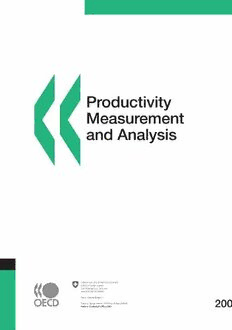Download Productivity Measurement and Analysis PDF Free - Full Version
Download Productivity Measurement and Analysis by OECD Organisation for Economic Co-operation and Development in PDF format completely FREE. No registration required, no payment needed. Get instant access to this valuable resource on PDFdrive.to!
About Productivity Measurement and Analysis
Productivity measurement and analysis are the main topics addressed in this book, which brings together contributions presented and discussed in two international workshops organized by the Statistics Directorate and the Directorate for Science, Technology and Industry (DSTI) of the OECD. The first workshop was organized jointly by the OECD with Fundaccion BBVA and the Instituto Valenciano de Investigaciones Econ??micas and held in Madrid in October 2005, and the second one was organized jointly by the OECD and the Swiss Federal Statistical Office and the State Secretary for Economic Affairs of Switzerland and held in Bern in October 2006. The two workshops brought together representatives of statistical offices, central banks and other branches of government in OECD countries that are engaged in the analysis and the measurement of productivity developments at aggregate and industry levels. Table of Content : -Introduction -1. OECD Workshops on Productivity Analysis and Measurement: Conclusions and Future Directions by Erwin Diewert PART 1: PRODUCTIVITY GROWTH IN SPAIN AND IN SWITZERLAND -2. Productivity Growth and Innovation in OECD by Dominique Guellec and Dirk Pilat -3. The Role of ICT on the Spanish Productivity Slowdown by Matilde Mas and Javier Quesada -4. Multi-factor Productivity Measurement: from Data Pitfalls to Problem Solving the Swiss Way by Gregory Rais and Pierre Sollberger -5. Innovation and Labour Productivity Growth in Switzerland: An Analysis Based on Firm Level Data by Spyros Arvanitis and Jan-Egbert Sturm PART 2: THE MEASURE OF LABOUR INPUT -6. On the Importance of Using Comparable Labour Input to Make International Comparison of Productivity Levels: Canada-U.S., A Case Study by Jean-Pierre Maynard -7. Labour Productivity Based on Integrated Labour Accounts Does It Make Any Difference? by Kamilla Heurl?©n and Henrik Sejerbo S??rensen -8. Are Those Who Bring Work Home Really Working Longer Hours? Implications for BLS Productivity Measures by Lucy P. Eldridge and Sabrina Wulff Pabilonia PART 3: THE MEASURE OF THE COMPOSITION OF LABOUR INPUT -9. Main Sources of Quarterly Labour Productivity Data for the Euro Area by Wim Haine and Andrew Kanutin -10. U.S. Quarterly Productivity Measures: Uses and Methods by Lucy P. Eldridge, Marilyn E. Manser and Phyllis Flohr Otto -11. Labour Input Productivity: Comparative Measures and Quality Issues by Antonella Baldassarini and Nadia Di Veroli -12. Changes in Human Capital: Implications for Productivity Growth in the Euro Area by Guido Schwerdt and Jarkko Turunen PART 4. THE MEASUREMENT OF CAPITAL INPUT -13. International Comparisons of Levels of Capital Input and Multi-factor Productivity by Paul Schreyer -14. Research and Development as a Value Creating Asset by Emma Edworthy and Gavin Wallis -15. Empirical Analysis of the Effects of R D on Productivity: Implications for productivity measurement? by Dean Parham -16. Infrastructures and New Technologies as Sources of Spanish Economic Growth by Matilde Mas -17. New Technologies and the Growth of Capital Services: A Sensitivity Analysis for the Italian Economy over 19802003 by Massimiliano Iommi, Cecilia Jona-Lasinio PART 5: THE MEASURE OF INDUSTRY LEVEL MULTI-FACTOR PRODUCTIVITY -18. Productivity Measurement at Statistics Netherlands by Dirk van den Bergen, Myriam van Rooijen-Horsten, Mark de Haan and Bert M. Balk -19. Sectoral Productivity in the United States: Recent Developments and the Role of IT by Carol Corrado, Paul Lengermann, Eric J. Bartelsman and J. Joseph Beaulieu -20. Estimates of Industry Level Multifactor Productivity in Australia: Measurement Initiatives and Issues by Paul Roberts -21. Shopping with Friends gives more Fun; How Competition, Innovation and Productivity Relate in Dutch Retail Trade by Harold Creu
Detailed Information
| Author: | OECD Organisation for Economic Co-operation and Development |
|---|---|
| Publication Year: | 2009 |
| ISBN: | 9789264044555 |
| Pages: | 556 |
| Language: | English |
| File Size: | 4.773 |
| Format: | |
| Price: | FREE |
Safe & Secure Download - No registration required
Why Choose PDFdrive for Your Free Productivity Measurement and Analysis Download?
- 100% Free: No hidden fees or subscriptions required for one book every day.
- No Registration: Immediate access is available without creating accounts for one book every day.
- Safe and Secure: Clean downloads without malware or viruses
- Multiple Formats: PDF, MOBI, Mpub,... optimized for all devices
- Educational Resource: Supporting knowledge sharing and learning
Frequently Asked Questions
Is it really free to download Productivity Measurement and Analysis PDF?
Yes, on https://PDFdrive.to you can download Productivity Measurement and Analysis by OECD Organisation for Economic Co-operation and Development completely free. We don't require any payment, subscription, or registration to access this PDF file. For 3 books every day.
How can I read Productivity Measurement and Analysis on my mobile device?
After downloading Productivity Measurement and Analysis PDF, you can open it with any PDF reader app on your phone or tablet. We recommend using Adobe Acrobat Reader, Apple Books, or Google Play Books for the best reading experience.
Is this the full version of Productivity Measurement and Analysis?
Yes, this is the complete PDF version of Productivity Measurement and Analysis by OECD Organisation for Economic Co-operation and Development. You will be able to read the entire content as in the printed version without missing any pages.
Is it legal to download Productivity Measurement and Analysis PDF for free?
https://PDFdrive.to provides links to free educational resources available online. We do not store any files on our servers. Please be aware of copyright laws in your country before downloading.
The materials shared are intended for research, educational, and personal use in accordance with fair use principles.

